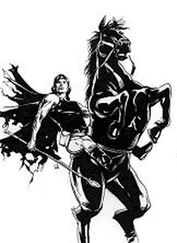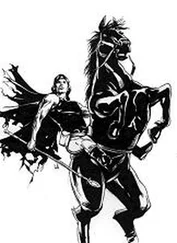Jack Chalker - Priam's Lens
Здесь есть возможность читать онлайн «Jack Chalker - Priam's Lens» весь текст электронной книги совершенно бесплатно (целиком полную версию без сокращений). В некоторых случаях можно слушать аудио, скачать через торрент в формате fb2 и присутствует краткое содержание. Год выпуска: 1999, ISBN: 1999, Издательство: Del Rey / Ballantine, Жанр: Фантастика и фэнтези, на английском языке. Описание произведения, (предисловие) а так же отзывы посетителей доступны на портале библиотеки ЛибКат.
- Название:Priam's Lens
- Автор:
- Издательство:Del Rey / Ballantine
- Жанр:
- Год:1999
- ISBN:0-345-40294-4
- Рейтинг книги:3 / 5. Голосов: 1
-
Избранное:Добавить в избранное
- Отзывы:
-
Ваша оценка:
- 60
- 1
- 2
- 3
- 4
- 5
Priam's Lens: краткое содержание, описание и аннотация
Предлагаем к чтению аннотацию, описание, краткое содержание или предисловие (зависит от того, что написал сам автор книги «Priam's Lens»). Если вы не нашли необходимую информацию о книге — напишите в комментариях, мы постараемся отыскать её.
Priam's Lens — читать онлайн бесплатно полную книгу (весь текст) целиком
Ниже представлен текст книги, разбитый по страницам. Система сохранения места последней прочитанной страницы, позволяет с удобством читать онлайн бесплатно книгу «Priam's Lens», без необходимости каждый раз заново искать на чём Вы остановились. Поставьте закладку, и сможете в любой момент перейти на страницу, на которой закончили чтение.
Интервал:
Закладка:
“The Grand Highway,” Father Chicanis sighed. “From Eden to Olympus. You can see Olympus sometimes from high points around here. Not the mighty one of legend, but the tallest peak in the far range, always snow-covered and mysterious-looking. It’s tall enough to make some of its own weather and obscure itself early on in the day, which is why they named it after the legendary abode of the ancient Greek gods.”
“I’m surprised your church wasn’t upset with all this naming of things after ancient pagan gods,” Harker commented.
“Oh, well, it is a good thing to remember your heritage and where your people came from. That’s not at all blasphemous. That age produced the first great thinkers of what came to be called `western’ civilization, to differentiate it from the east. Geometry and the higher mathematics, much physics, the first great plays—it was quite a time. The only blasphemy would be to worship the old gods, and I’m not even sure many of the Greek thinkers really believed in them, either. They just had no alternatives at that time.”
N’Gana cleared his throat. “Um, Father, interesting history, but where does this road go?”
“It’s on the old maps—oh, yes, I forgot, they’re pretty well dissolved by now. Well, it started in Ephesus, coming out of a kind of ring road around the city, and it extended diagonally across the valley and then went through a tunnel almost sixty kilometers long before it emerged in a glacial valley on the other side. More tunnels, more valleys, and finally it reached all the way to Corinth on the opposite coast. It used to take a few pleasant hours at a steady four hundred kilometers per hour.”
N’Gana was only interested in the Ephesus route. “All right, then, so if we can follow it with this overgrowth it should take us where we want to go.”
“The road was built to hit the big truck farms this region had,” the priest told him. “It isn’t exactly straight. At a guess, we’ll go inland from here to go around the coast range and then to Sparta, and then swing around through the pass and down into the coastal plain and Ephesus.” He sighed. “I wish I had a landmark, something that would tell me where we are now. If I knew that I almost certainly could determine if it would be faster or slower to follow the roadbed.”
“What’s the worst case?” N’Gana asked him. “How much would it add?”
“A day, maybe two, of walking,” Chicanis told him. “Why?”
“It’s still here, that’s why,” the colonel replied. “It makes a decent path to follow. We know that the road goes where we want it to and we know that all the major land obstacles would have been removed except—what’s the name of that river?”
“The River Lethe,” Chicanis replied.
“Yes. That we’ll have to contend with, perhaps using ingenuity this close to the ocean. I don’t expect any bridgeworks will have met any better fate than the road surface or our own gear. Still, this will give us a trail that may make our going a bit easier. We’re already dependent on the land for most of our food; the road connected the truck farms to the cities and towns. We’ll follow it.”
That night the storms were particularly fierce, and the lightning struck close to them many times. Some of the magnetic materials left over from the old road made nice targets for the bolts, something they hadn’t really thought about. N’Gana was firm, though, that they would stick close to the road although not camp exactly on it. They had still not seen much sign of other humans. If the lightning kept them away, all the better, and the walking was much easier than it would have been otherwise.
The eighth night on the mainland, Harker and Socolov drew first watch, which now began after the storm passed. There was virtually nothing left of their fine packs, tough clothing, or anything else. Even the weapons had disintegrated to the point where they were barely scraps of junk metal and wood. Rifle barrels were now truncheons, and very lethal ones, too, if it came to that. Using a leathery leaf from a common wild bush that Chicanis said was one of the few thriving native species of plant left on Helena—that is, not an import by the terraformers—they managed to create pouches and saved a great many bullets. They were metal and were also filled with gunpowder; they had not been affected by the rot and were still a possible weapon if there was time to use them. The knife handles, unfortunately, proved to be of less natural origin. The blades survived, but they were unbalanced and useful mostly for digging or scraping.
The same tough leaf, with the equally strong and common stripped vine, they used to salvage as much of their modesty as they could, mostly out of deference to the anthropologist. Harker discovered her, with a gun barrel as a weapon, sitting on a rock in the darkness. Achilles was now three-quarters full, and there was at least some light to see with. All of them hoped that they’d be well away before a new moon.
She had, he noticed, gone au naturel. So much for her sensibilities, he thought. It was the last defense; they’d all cast off their boots after discovering that a fairly nasty kind of algae started growing inside them and secreting a toxic irritant on the feet. It was inevitable sooner or later anyway, and the sooner they did it, the sooner their feet would toughen. The first day barefoot, though, had been awful, and tonight wasn’t all that much better.
“No fig leaf?” he asked her, sitting down nearby.
“Why bother? We aren’t hiding anything and those things are a joke when you walk.” She gave a slight chuckle. “It’s funny—somehow it doesn’t seem all that risque. In fact, it feels really comfortable in this climate. Besides, I think if I were going to be raped by any of you guys, it would have happened before now.”
“Not once we saw that bodybuilder’s physique,” he responded in the same light tone. “Where’d you get muscle tone like that? Not in a college classroom, I bet. I haven’t seen a woman with muscles that developed since I once saw Bambi the Destroyer coming out of the shower.”
“Bambi the what?” She laughed.
“Her name’s really Barbara Fenitucci. A real Amazon warrior and a Marine to boot. Always picking on the men, always having to prove she could do anything they could do better and in half the time.”
“Sounds interesting. I’ve known a lot of women like that, but, no, I was never in the Marines and I never wanted to be a man, which is sort of what that’s about. I bet she was a service brat. Marines and the like are really driven as kids. No, I spent a lot of time getting this way, and I’m afraid if I don’t do some regular heavy lifting I’m going to lose part of it. It’s a matter of independence. Of being able to do what you want, go where you want to go, and not live in terror of every guy on the street. I did martial arts first—almost everybody does, I think—and got good enough in a couple of useful disciplines, and I kept it up. Then they opened this training and conditioning program at the university where I was working on my doctorate. I gave it a try and liked it. I weighed in at sixty-three kilos and was bench-pressing more than a hundred and forty kilos before I left to board the Odysseus. Fortunately, they had a good and well-equipped gym on board, mostly for the mercenary twins, and I was able to keep it up. I didn’t want to have to worry about being the only female on the trip.”
He made a guess. “And that’s why you were so upset at yourself on landing? All that, and big razor-sharp claws come up and there are monsters under the sand and the only thing you can do about it is listen to the big guy scream at you to run?”
“Something like that. You can’t believe how cocky you get when you have this much of your body developed. I think I’d forgotten what it was like to be terrified, and there I was, all that crap gone to waste. The first crisis on the new world and I froze in fear.”
Читать дальшеИнтервал:
Закладка:
Похожие книги на «Priam's Lens»
Представляем Вашему вниманию похожие книги на «Priam's Lens» списком для выбора. Мы отобрали схожую по названию и смыслу литературу в надежде предоставить читателям больше вариантов отыскать новые, интересные, ещё непрочитанные произведения.
Обсуждение, отзывы о книге «Priam's Lens» и просто собственные мнения читателей. Оставьте ваши комментарии, напишите, что Вы думаете о произведении, его смысле или главных героях. Укажите что конкретно понравилось, а что нет, и почему Вы так считаете.












